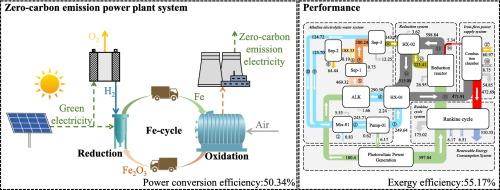Decarbonizing power generation through Iron-based fuel cycles: A thermodynamic and thermo-economic analysis
IF 11
1区 工程技术
Q1 ENERGY & FUELS
引用次数: 0
Abstract
A novel zero‑carbon power generation system for a 300 MW plant is proposed, utilizing iron as a chemical energy carrier to integrate renewable energy. In the proposed system, iron combustion drives the steam Rankine cycle for electricity generation, and the produced iron oxide is reduced by hydrogen from an alkaline electrolyzer powered by renewable energy, completing the cycle. Relative to a conventional 300 MW coal-fired plant based on 5E (Energy, exergy, environmental, economic and exergoeconomic) analysis, the proposed system demonstrates a 0.72 % improvement in energy efficiency and a 12.35 % increase in exergy efficiency. The power conversion efficiency of the proposed system is 10.64 % higher than that of the methanol-based hydrogen production system. The life cycle assessment has validated the environmental friendliness of the system during its operation process. The cost of electricity production is reduced from 94.57 $/MWh to 60.01 $/MWh, with minimal influence from iron costs due to low cycle losses. Economic analysis indicates that the photovoltaic system, alkaline electrolyzer, and steam Rankine cycle contribute to 98.31 % of total economic losses. The proposed system facilitates long-distance, efficient renewable energy utilization and zero‑carbon power generation, providing a feasible framework for energy decarbonization and cross-regional renewable energy integration.

通过铁基燃料循环脱碳发电:热力学和热经济分析
提出了一种用于300mw电厂的新型零碳发电系统,该系统利用铁作为化学能源载体来整合可再生能源。在提出的系统中,铁燃烧驱动蒸汽朗肯循环发电,产生的氧化铁被可再生能源驱动的碱性电解槽中的氢还原,完成循环。基于5E(能源、火用、环境、经济和火用经济)分析,与传统的300兆瓦燃煤电厂相比,该系统的能源效率提高了0.72%,火用效率提高了12.35%。该系统的功率转换效率比甲醇制氢系统高10.64%。生命周期评估验证了系统在运行过程中的环境友好性。电力生产成本从94.57美元/兆瓦时降至60.01美元/兆瓦时,由于周期损耗低,铁成本的影响最小。经济分析表明,光伏系统、碱性电解槽和蒸汽朗肯循环的经济损失占总经济损失的98.31%。该系统促进了可再生能源的远距离高效利用和零碳发电,为能源脱碳和跨区域可再生能源一体化提供了可行的框架。
本文章由计算机程序翻译,如有差异,请以英文原文为准。
求助全文
约1分钟内获得全文
求助全文
来源期刊

Applied Energy
工程技术-工程:化工
CiteScore
21.20
自引率
10.70%
发文量
1830
审稿时长
41 days
期刊介绍:
Applied Energy serves as a platform for sharing innovations, research, development, and demonstrations in energy conversion, conservation, and sustainable energy systems. The journal covers topics such as optimal energy resource use, environmental pollutant mitigation, and energy process analysis. It welcomes original papers, review articles, technical notes, and letters to the editor. Authors are encouraged to submit manuscripts that bridge the gap between research, development, and implementation. The journal addresses a wide spectrum of topics, including fossil and renewable energy technologies, energy economics, and environmental impacts. Applied Energy also explores modeling and forecasting, conservation strategies, and the social and economic implications of energy policies, including climate change mitigation. It is complemented by the open-access journal Advances in Applied Energy.
 求助内容:
求助内容: 应助结果提醒方式:
应助结果提醒方式:


